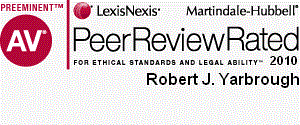Newsletter Issue 6 - August 2009
In this issue:
New PTO Administrator sworn in.
Is a download a performance?
Supreme Court to consider what can be patented.
Real trademarks in a virtual world, part II
New PTO Administrator
by Robert J. Yarbrough
David Kappos was sworn in as the new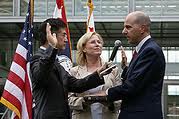 Administrator of the PTO
this month. As Administrator, he will be the chief executive officer
of the agency and in charge of the PTO's several thousand employees,
including patent and trademark examiners.
Mr. Kappos has spent his
career as in-house patent counsel to IBM, the
single largest
generator of patent applications and patents in the United States.
Administrator of the PTO
this month. As Administrator, he will be the chief executive officer
of the agency and in charge of the PTO's several thousand employees,
including patent and trademark examiners.
Mr. Kappos has spent his
career as in-house patent counsel to IBM, the
single largest
generator of patent applications and patents in the United States.
The PTO faces several difficult issues, including a sharp drop in the number of patent applications and the resulting drop in revenue to the agency, coupled with a backlog of over 770,000 applications. awaiting review.
Is a download a performance?
by Adam Garson
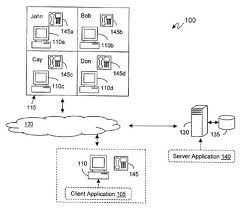 Composers think so.
The Copyright Act is continually subject to pressures created
by technological and economic forces.
Here's yet another example.
Composers think so.
The Copyright Act is continually subject to pressures created
by technological and economic forces.
Here's yet another example.
Composers and producers are urging Congress to change copyright law so that music airing in a audio-visual downloads are considered public performances and, therefore, deserving of royalty compensation. Federal law, of course, grants owners of copyrights the exclusive right to perform their works in public; however, a New York federal court held in 1977 that music downloads are not to be construed as performances but merely mechanical reproductions. The decision is of great concern to various song writing and publishing groups, including the Association of Independent Music Publishers (AIMP) and Broadcast Music, Inc. (BMI), who have recently written Congress urging it to change copyright law to enable their members to collect royalties from digital downloads.
The groups wrote that "songwriters and composers now receive public performing right royalties for their musical works when they are transmitted as part of audio visual broadcast and cable programming. However, as delivery of such content shifts to online platforms, and often in the form of transmissions via digital downloads, these music creators are concerned that they will not receive compensation for the performances of their works as they would from broadcast, satellite and cable distribution. The mere choice by a consumer to view his or her favorite movie or television show in a non-linear, time- or space-shifted fashion, whether "streamed" online or from a downloaded digital file accessed while commuting or viewing in a coffee shop, should not determine whether a songwriter or composer of the music accompanying such programming receives public performing right royalties."
One might question whether private listening in a car or in a coffee shop is a "performance" in the traditional sense of the word. Nevertheless, the stakes are high and maybe worth, according to Reuters, as much as $100 million dollars per year.
The Digital Media Association (DMA) has taken a contrary position, arguing that public performance rights arise only where there is an actual, audible, and public performance. The DMA observed that digital downloads simply substitute for traditional physical products such as DVD's or CD's and that producers of downloads are already obligated to pay synchronization and distribution royalties to songwriters and music publishers. Broadening songwriters' and composers' rights to instances where no performance occurs is, according the DMA, double-dipping.
The House Judiciary Committee is considering a hearing on the issue.
Supreme Court to consider what can be patented.
by Robert J. Yarbrough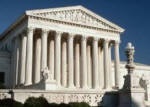
For several years, the U.S. has considered methods of doing business and computer software as proper subjects for patents, while the rest of the world generally does not.
In October 2008, the Federal Circuit Court of Appeals considered the issue of what processes can be patented in the case of In Re Bilski. The Federal Circuit substantially limited the patentability of software and business method inventions. The Court determined that a 'process' is only subject to patent protection if .... (1) it is tied to a particular machine or apparatus, or (2) it transforms a particular article into a different state or thing."
According to the Federal Circuit, any process that can occur entirely in a human mind is not tied to a machine and hence is not patentable. A 'transformation' must be a physical transformation. A change in a legal obligation or relationship is not a physical transformation.
Does implementing a process in a general purpose computer tie the process to a 'particular machine' and make the process something that can be patented? It does not, according to subsequent decisions.
Don't count software and business method patents out yet. In June of 2009, the Supreme Court of the United States agreed to hear Bilski's appeal from the Federal Circuit decision.
Real trademarks used in virtual worlds, Part II.
by Adam Garson
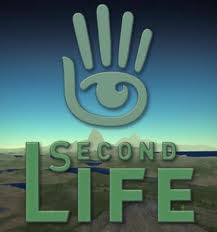
In our June 2009 newsletter, we wrote about the challenges posed by Virtual Worlds such as Second Life to trademark owners. The commercialization of virtual worlds by real life companies and the apparently rampant unauthorized use of trademarks by virtual world residents has created new "territory" for trademark owners to police their marks.
Linden Research, Inc., the owner of Second Life, now provides an avenue to report trademark infringement occurring in Second Life. Owners can report infringements directly to Linden's legal department so long as they provide proof that they are the owners of the trademark in question. Likewise, upon submission of a legally sufficient DMCA takedown notice, Linden will remove material infringing an owner's copyright.
To learn more about Linden Research, Inc.'s intellectual property policies, visit it's wiki and blog.

